Rick Wayne's Blog, page 78
May 30, 2018
The mutant techno-fantasies of Josan Gonzalez
[image error] [image error] [image error] [image error] [image error] [image error] [image error] [image error] [image error] [image error] [image error] [image error] [image error] [image error]
May 29, 2018
(Fiction) The meaning of magic
Dad was on big important phone calls all the next day, with bankers I think. Mr. A. Tranjay had said at dinner that his work would be done soon, and that was quicker than anyone expected. I didn’t want him to go. I liked having him there. I didn’t know where he loved but I thought he should move in with us. I looked all morning to see if he was in the garage, but the light was off and the door was closed, so I looked at the book he gave me instead. I had hid it under my mattress, which seemed like the only place no one would look. I had my dad’s laptop on my desk—I was supposed to be doing homework—and I was trying to translate it like he said, but it wasn’t going very well. Still, I wanted to show him I could do it, and it was better than math. That’s when I heard flute music.
I smiled.
I closed the computer and put the book back under my mattress. I went to the back door but Dad had remembered to lock it that day, like he said he was going to do. I sighed. I looked at the ceiling. I could hear my dad in his office. He had left the key hanging from a nail high at the top. He said it was just for emergencies. In case the house caught fire or something. I stared at it as the music came through the gap under the door along with the cold air. It was a drafty old house. That’s what Dad said. That’s why we were renovating.
Dad had locked the door to keep me safe. But if I went out, I would be with Mr. A. Tranjay, and I knew that was safer than anywhere else.
I slid a kitchen chair across the floor quietly and opened the door. Then I put the key and the chair back.
It was cool outside but warmer than the day before. The music was coming from the hollow, from a little clearing over the first big hump of earth. He heard me coming, I think, because he stopped playing. But when he turned and saw me climbing over a fallen log, he seemed disappointed.
“I’m sorry,” I said. I wanted to turn around and run home. It seemed then like no one wanted me. Not my mom. Not my dad. Not even Mr. A. Tranjay, who didn’t have anyone.
He sighed. He seemed so weak, weaker even than the night before.
“No, no. It’s not you. I had just hoped you were someone else.”
I looked around at the bare trees and all the leaves on the ground. There was no one.
“Who?”
“Our allies. Against the dark power.”
“Allies? Like in a war?” I stood near him but I didn’t sit. I thought maybe I still wasn’t welcome.
“Quasi. There was a time when men respected what came out of the cracks under the trees.” He pointed to one across the little clearing. It looked like a little animal den to me.
I asked if those men were afraid like I was and he said sometimes. But not like now. He said people used to respect the Others but that some important churchmen who lived far away in a big city and who had never even seen them had said all the Others were bad, even the good ones, and so the people chased them away, and that was bad because the nice ones were our best help against the mean ones. Then he said sending the bad ones back where they belonged was a special kind of job, and in the old days only people with special training were allowed to do it.
“In the Old Country,” I said, mimicking my dad.
“Older than that,” he explained. “Before chariots and bronze.”
He motioned to the spot next to him and I sat. He said in the really, really old days there were special people who could step through the holes in the ground—and those in the sky and under the water and inside the fire. They could walk the lands of the Others. He said there were so many different lands, no one could ever count them all. And it was dangerous. Sometimes these special people got lost and never made it back, and that was bad for the folks at home who relied on them. But for the most part, he said, these special people knew ways of helping the Others move on, or if that didn’t work, of trapping them so they couldn’t hurt anybody, or pulling them out of a body if they already had.
Sometimes they even had to be destroyed. But he said you shouldn’t ever do that though because it made the other Others really angry and more would come.
“Like a bee hive?”
He nodded. I think he liked telling me things, like a teacher. He seemed lonely. Like me.
I asked if any of the Others were bad, and he said yes.
“Like my secret,” I said.
“Worse, even.”
I nodded. It seemed like we were sort of the same then. We both had a secret we were trying to stop from hurting people. But we were different, too, because I hadn’t finished my math but I think he was done with his work on the lot and just didn’t want to tell anyone. It seemed like he was waiting for something.
“The good ones rarely come across.” He looked to the sky. “They remember how they were treated. And like all good and noble things, they’re happy with what and where they are. Help, it seems, is not coming.”
“Is that why you’re playing the flute?”
He cradled it in his hands. “I thought if I divested myself of all that I had gained, if I gave it away or let it burn in the fire, if I retired from everything and everyone, if I fasted and observed the ancient rites, if I humbled myself . . .”
He said that word like it was more important than the others. But he didn’t finish his sentence.
“Is there really such a thing as magic?” I asked.
He raised his eyes to me. “What do you think?”
I immediately pictured my dad reading his Tolkien books in his armchair at our old house. And the collection of books he ordered on the internet about dragons and fairies and stuff. He got rid of everything after “the incident.”
“My dad says it’s not true. But I think that’s because he wants it to be true and he’s disappointed he hasn’t found any.”
“Hasn’t he? What would magic look like? If it was real? Wands and sparkles and blasts of light? Like fireworks and laser beams? Or perhaps cups of blood and snarls and levitating candles?”
I shrugged. “We had a magician come to school once.”
“Oh?”
I nodded. “But he didn’t saw anyone in half.”
“You sound disappointed.”
“And there was a guy who threw knives at this woman. She was strapped to this big spinning circle. He threw the knives at her. But he kept missing.”
Mr. A. Tranjay smiled. “When you coaxed your secret away from the girl, your classmate, what did you say?”
I shrugged.
“You spoke to it. You used words, right?”
I nodded.
“A spell. Of your own devising. To summon a creature not of this plane. Albeit only a few feet away.”
I scowled. “But if that’s all it is, then how is magic any different than anything else?”
“Who said it is?”
I hadn’t expected that. “Everyone. Everyone says it’s different.”
“Because that’s what they were told. And that’s why they don’t see it.”
I made a face.
“It’s all around you. Even now.”
I looked around. I didn’t see anything but the hollow. I looked back to him.
“Do you believe your father loves you?”
“Yes.”
“How do you know? Have you seen this love? Has it come out of him in a brilliant flash and wrapped you up in a twinkle of flowers? Can you conjure it with incantations?”
“No.”
“Then how do you know? If it isn’t made of atoms? If you can’t pour it into a bottle and weigh it?”
I suddenly got very scared. I worried Mr. A. Tranjay was going to tell me my dad didn’t love me, that it wasn’t real. Maybe my mom, too. Dad said she still loved me more than anything, but maybe she didn’t and that’s why she went away.
“Because of what he does for me. And the things he says. And how he worries so much.”
He nodded. “So your father loves you. Very much. You know it’s there. And it’s as real as anything else. You can’t see it or touch it or measure it or melt it or dunk it in acid, yet it matters more than any of those things you can. Right?”
I nodded.
“There are people in the world who don’t believe in that. They don’t believe in anything that won’t return a particle, as if we could ever hold the best of life in our hands. Like humor. Do you know what that is?”
I nodded again, but I wasn’t sure.
“It’s the good feeling you get when you hear a funny joke. It’s what shakes your throat and pulls a laugh from your belly. You can stop yourself from laughing, but the greater the humor, the greater the effort to resist. You have to push back against something. Sometimes very hard. The thing you’re pushing against, that’s humor. It can be felt. But like love, it can’t be captured or weighed or smelted into hate. And just like love, our capacity for it is innate, but our expression of it has to be learned. Has anyone ever tried to explain a joke to you?”
I nodded. “My friend Chelsea did once. At my old school.”
I realized then that I missed my friend Chelsea, and that I had almost forgot about her. I wondered if eventually I would forget her completely. Would she still be real? Then I thought about my mom.
“Was it funny? When she explained it?”
I shook my head.
“It loses something, doesn’t it?”
“The humor goes away?”
“Magic is like that. It can’t be memorized. Or learned. It has to be understood. Felt. Inside.” He put his fingertips to his heart. “Like humor. It can’t be explained. You can’t instruct someone in it. Just as an explained joke produces no humor, a dissected spell is a lifeless thing. Stillborn. That’s why no one ever learns magic from a book—as if you could compose a master symphony simply by reading a history of music. It’s why magicians always sound so hopelessly obscure. Like poets. They can never get at their subject directly. They can only point to it. It’s why people who don’t know magic can walk through the world and not see any of it. Even though, like humor and love and all the rest, it’s all around them. All the time.”
He waited for me to say something. I think he’d told me something very important then. But maybe he knew I didn’t understand.
“When your friend explained her joke, did you laugh?”
“A little.”
“Even though it wasn’t funny?”
I nodded.
“Why?”
“Because I wanted her to feel good.”
Mr. A. Tranjay patted my arm. “That right there. That is the most important kind of magic.”
“Are you going somewhere?”
He smiled at me with his eyes. “I think that’s enough for today.” He stood with a groan, like it hurt his knees. He looked so thin. His eyes had seemed so bright before. Now they had shrunk into the shadow of his eye sockets.
I thought the stag would be coming through the door again soon.
I’m posting the chapters of my forthcoming urban paranormal mystery, FEAST OF SHADOWS. A blend of hard-boiled whodunit and contemporary urban fantasy, it’s scheduled to be released later this summer. You can sign up here to be notified.
You can start reading in order here: The old ones are patient.
The next chapter is: (not yet posted)
[image error]
May 28, 2018
Why hit songs sound the same
The data visualists over at The Pudding have put together a fascinating analysis of pop music going back to the 1950s using an eight-point measure originally developed at MIT.
From the article:
In 2005, Tristan Jehan, a PhD student at MIT, published his dissertation, “Creating Music By Listening,” a framework for AI-created music. The immediate implication of Jehan’s work has not been the human-to-robot gift of art, but reducing a song to a small set of data points that say something about the song generally, such as “valence” (roughly the happy to sad spectrum) and “energy” (arousing to soporific). Shortly after completing his dissertation, Jehan co-founded a company called EchoNest, and the data became a pillar of Spotify’s recommendation systems, determining music similarity and accurately suggesting songs that sound alike.
This data is publicly available, and to measure whether songs sound similar, we’ll calculate the differences in EchoNest’s 8 data points for top songs in the Billboard Hot 100, a peer-reviewed method employed by other music researchers. In theory, the songs with most similar EchoNest values should sound similar as well.
The result is a trend toward similarity, with smaller distances among songs. To date, songs that charted between 2012 and 2016 were the most similar, according to EchoNest data.
John Seabrook is a staff writer at the New Yorker and author of The Song Machine, a history of pop music’s last 25 years of unstoppable hit-making sophistication. When he looked at this trend, what did he see?
“What I see,” he said, “is the enormous, quick but large scale shift from the kind of craft-like song-making process of people putting together lyrics and melody in a semi-organic setting to what I call the track-and-hook method…”
[image error]
For the record, I like pop music, but this does seem to confirm my suspicion that it’s more canned and commercial than ever before. There’s nothing wrong with enjoying a piece of candy. You should just know that’s what you’re eating.
May 27, 2018
Fine and Mellow
Lester Young (August 27, 1909 – March 15, 1959), nicknamed “Pres” or “Prez”, was an American jazz tenor saxophonist. After achieving prominence in Count Basie’s orchestra, Young became one of the most influential players on his instrument. In contrast to many of his hard-driving peers, Young had a relaxed, cool manner that he paired with sophisticated harmonies in what one critic called “a free-floating style, wheeling and diving like a gull, banking with low, funky riffs that pleased dancers and listeners alike.” Known for his hip, introverted personality, he invented or popularized much of the hipster jargon which came to be associated with the music.
Young left the Basie band in late 1940. He is rumored to have refused to play with the band on Friday, December 13 of that year for superstitious reasons spurring his dismissal, although Young and drummer Jo Jones would later state that his departure had been in the works for months. He subsequently led a number of small groups that often included his brother. It was during this period that Young accompanied the singer Billie Holiday and also made a small set of recordings with Nat “King” Cole, their first of several collaborations.
In September 1944, Young was in Los Angeles, again with the Basie Band, when he was inducted into the U.S. Army. Unlike many white musicians, who were placed in band outfits such as the ones led by Glenn Miller and Artie Shaw, Young was assigned to the regular army where he was not allowed to play his saxophone. While at Ft. McClellan, Alabama, Young was found with marijuana and alcohol among his possessions and was soon court-martialed. He did not fight the charges and served one traumatic year in a detention barracks. He was dishonorably discharged in late 1945.
While the quality and consistency of Young’s playing ebbed gradually in the latter half of the 1940s, he also gave some brilliant performances. But from around 1951, Young went into steep decline as his drinking increased. His playing showed reliance on a small number of clichéd phrases, and he eventually suffered a nervous breakdown, for which he was hospitalized in November 1955.
He emerged much improved and started recording again. On December 8, 1957, Young appeared with Billie Holiday, Coleman Hawkins, and others in the CBS television special The Sound of Jazz, performing Holiday’s tune “Fine and Mellow.” It was a reunion with Holiday, with whom he had lost contact over the years. She was also in physical decline and near the end of her career, yet they both gave moving performances. Young’s solo was brilliant and is considered by many jazz musicians an unparalleled marvel of economy, phrasing, and extraordinarily moving emotion.
But by this time his alcoholism had cumulative effect. He made his final studio recordings and live performances in Paris in March 1959 at the tail end of an abbreviated European tour during which he ate next to nothing and drank heavily. He died in the early morning of March 15, 1959, only hours after arriving back in New York, at the age of 49. He was buried at the Cemetery of the Evergreens in Brooklyn. According to jazz critic Leonard Feather, who rode with Holiday in a taxi to Young’s funeral, she said after the services, “I’ll be the next one to go.”
Holiday died four months later on July 17, 1959 at age 44. [Abridged from Wikipedia]
Here is that performance — Young and Holiday and a handful of other jazz legends, including Coleman Hawkins, Ben Webster, and Gerry Mulligan. In addition to the great solo performances, watch Billie’s face, especially at 1:21, right before Lester starts playing. (You can always recognize Young by his signature pork pie hat.) And if you want the deeper context, a sense of change and history, compare this to Billie and Lester’s 1937 snappy recording of “He Ain’t Got Rhythm.”
Here is your soundtrack to tonight.
And here is the full ongoing playlist, approaching 800 songs.
The feral femininity of Charlotte Grimm (NSFW)
Charlotte Grimm (@espiritconfus on Instagram) is an art therapy student and fairy tale-esque photographer based out of Leipzig, Germany whose dark fantasy-inspired works explore, or perhaps expose, a sexually potent yet unapologetically self-assured femininity.
But despite the nudity, these are not erotic works. Grimm’s subjects are not handing themselves to the gaze of the viewer. They are exposed — often naked and always out of doors, for example — and sometimes vulnerable, but they remain untamed and are not asking to be admired by the viewer.
In the first image below, for example, the model is young and beautiful of course, and her face is dripping and her hair is messy. It seems as if she were just dancing a naked moon rite alone in a field, and we caught her, and she cares not.
I should also mention that, whether coincidence or intention, a different Charlotte Grimm — Charlotte Amalie Grimm (1793-1833) — was the sister of the Brothers Grimm.
This Charlotte can be found at www.espritconfus.com
[image error] [image error] [image error] [image error] [image error] [image error]
May 25, 2018
Look closely… bugs from a galaxy far, far away
This art by illustrator Richard Wilkinson is out of this world! Click below for larger images, or check out the full collection on the artist’s instagram: www.instagram.com/arthropoda_iconicus/
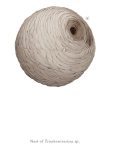
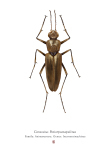
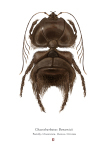
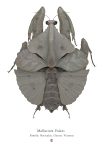
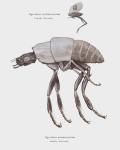
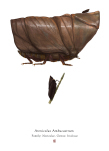
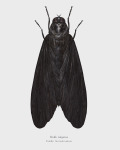
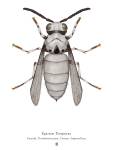
May 24, 2018
(Fiction) Time for dreaming
“Is the stag waiting for something?”
I stood in the doorway of the old garage.
I was supposed to go to a hospital in a couple days. Or was it tomorrow? I could never keep track. But I knew I was almost out of time. I needed help. Maybe I had to break my promise. I knew that was bad, but I didn’t want anyone to be hurt, and it seemed better to break a promise than let someone be hurt.
Mr. A. Tranjay was working. He had some kind of magnifying goggles on. He looked at me. They made his eyes huge. He set the bottle from the lot down—it had black goop inside—and took off the goggles. He had dark rings around his eyes. He looked sick. His hands were shaking.
“What makes you think I know of such things?”
I stepped in and looked up at him. “Don’t you?”
“Maybe. But how did you know that?”
I shrugged.
“When did you see it last?”
“Yesterday. On the way home from the doctor’s. They asked me a bunch of questions. And I have some pills to take.”
“I see.” He said it in a way that made me think he didn’t think much of my pills. “And what did it do, the stag?”
“I was looking out the window in the back seat. It was almost dark, and we passed a storage place. Like where people keep all the stuff they don’t need but don’t want to get rid of. There was a yellow-orange kind of light like they use in street lamps. It was on the side of the building. There was a sign, too. But it was high up a pole and one of the bulbs inside had burned out.
“The stag walked across the grass and onto the driveway in front of the gate. It stared at me as we drove by. It just watched. I thought my dad would see it for sure.”
“I don’t think your father is open to that. Not anymore. Not after your mother.”
“What do you mean?”
“Do you know things about people sometimes? Things they don’t tell you?”
I shrugged again.
“Yes, the stag is waiting for something. That is why the door is open, the one you wandered through. And the sooner I get on with it, the sooner he can close the door and keep anything bad from coming over.”
“Like the thing that’s hurting people?” He already knew about my secret. That it was out there.
“I don’t think that slipped through an open door. I suspect that was summoned across. Along with many other shades and shadows.”
I wasn’t quite sure what he meant. “Can you teach me how to stop it?”
“No.” He was firm. He put a hand on my shoulder. “Leave such things for adults.”
I didn’t say anything. But I didn’t leave.
“Promise me,” he said. “Your father is already very worried.”
“But it’s hurting kids.”
He stopped. “This is true.”
“Maybe you could stop it.”
“I don’t think I’m capable of stopping anything. Not anymore.”
“How come?”
“You ask a lot of questions.”
“I’m a kid.”
He stood with a groan and limped to a stack of books at the far end of the garage. They were in an open cardboard box. They were old, like really old. Not like the books at the library.
He reached into the box and moved some books around. His hands shook. He had to brace himself against the wall to keep from falling over.
“I wasn’t sure what to do with these.”
He pulled one out. It was long and narrow and made of leather. None of the pages were evenly cut. It looked like someone had stitched it together by hand. He handed it to me.
I took it. I read the title. Someone had taped it to the cover, which was otherwise blank. “Signs and Sy . . . Sy . . .”
“Cyphers.”
“Cyphers,” I repeated. “Martin . . .” I couldn’t pronounce the last name.
I cradled the spine in one hand and unhooked the metal clasp that kept it shut. I had never seen that before. There was dust. I sneezed. I almost dropped the book, but I pressed it to my coat at the last second. I might have wrinkled some of the pages. I opened them to look, and I saw symbols. Just like the ones on my window.
I looked up at Mr. A. Tranjay.
“Perhaps this will help. It’s an original. Very valuable. Hold on to it and you can sell it one day and pay for college.”
I looked at the words. It was all handwritten. I couldn’t even make out most of the letters because it was in cursive.
“Is it English?”
“It’s a medieval Slavic dialect.”
“What’s Slavic?”
“An ancient people. Made slaves by the Romans. That’s where we get our word.”
“But how will I read it?”
“I understand Google is very helpful.”
He sat down on the stool again and reached for the goggles. I closed the book and walked to the door. I stopped. I turned around.
“Did you really make all those people throw up?”
“No.” He picked up the bottle of black goo again and shook it. Whatever was inside was thick and ran down the sides like burnt syrup. I think that was the lot. I think people were supposed to eat it. “Only half.”
“Oh.” I waited. I didn’t want to leave. I didn’t have anything to do. I didn’t know how to translate an old book. Everything was always for adults. “Why?”
“Art.”
“I thought art was supposed to make people feel better.”
“Sometimes.”
“But why would you want to make people sick?”
“I didn’t want to make them sick. I wanted to show them something. About themselves.” He turned to me. “Maybe it’s something for when you’re older.”
I didn’t want him to be right. The book was slipping and I adjusted it against my side. I didn’t like so many things were just for adults.
I think he could tell he was frustrating me. And maybe he felt guilty for not helping. “Art is an exaggeration. Do you know that word? It is a lie that reveals the truth.”
I laughed a little. I didn’t mean to. It just came out.
“It’s true,” he objected. “Adults, they build a world much of which is false. And in such a world, you need a lie to reveal one, to expose the truth underneath, just the way it takes grit to make a polish.”
I thought about what my teacher said about Columbus and discovering America. “But what did you do?”
“I anesthetized a live cow and slaughtered it at the table.”
He inserted a long needle, like from a syringe, into the cork on the top of the bottle.
“What is an—annis . . .”
“Anesthetic is what the dentist gives you so your teeth won’t hurt when he drills.”
He drew some of the black syrup up the needle.
“Ohhhh. So the cow didn’t feel any pain.”
“Yes.”
“And then you cut it up?”
“I surgically removed one leg, the rump it was attached to, and part of the loin. There was quite a lot of blood. But I left the animal alive. And in no pain.”
“What happened to it?”
“I kept it.” He leaned over the work bench and squirted the syrup onto a little piece of glass. “Until it died of old age.”
“And you cooked the leg in front of everyone?”
“I drained, skinned, and carved it in front of my guests while they dined on a zoo of boiled anuses.” He paused as he put a few drops of clear liquid on top of the glass as well. “Served breaded like calamari.”
“What’s that?”
“Fried squid.”
“Yuck!” I made a face.
“Do you know what an anus is?” he asked.
“Is it like what the dentist gives me?”
“Better ask your father.”
“And people ate the cow?”
“A couple. Most wouldn’t touch it. Especially not with the animal watching them eat.”
I scrunched my nose. “It was watching them?”
“The beast had made a great sacrifice. It was given the position of honor, left absent until then, at the very head of the table. It dined on a bowl of baby greens. Docile. Chewing. Watching. Like a great brahmin.”
“What’s that?”
“Sort of like a priest.”
“I don’t think I could eat it.”
“Why not?”
I shrugged.
“But you eat beef?”
I nodded.
“Hamburgers?”
“Yeah.”
“What is the difference?”
I bit my lip then. Hard enough that I got that metallic taste on my tongue. “I dunno. It just seems wrong.”
“When you eat those things, you eat an animal that died. Often painfully. Inhumanely, even. You just don’t see it. It is kept from you. An illusion.”
“A lie,” I said.
“Yes.” He smiled. “But my cow lived. It made a sacrifice, and it spent the rest of its natural life peaceful and fulfilled. Is it not worse to die than to merely lose a limb? Or do you prefer a lie to the truth?”
I didn’t have an answer. I waited for him to say something else, but my dad started yelling. In the distance. I tensed. I forgot I wasn’t supposed to be outside the house without asking him. I was bad again.
I think Mr. A. Tranjay understood. “You must have patience with your father.”
“Sometimes I don’t think he is my father.”
“Why do you say that?”
I shrugged. “I don’t know. It’s just that, when we did our family genealogy project in school we learned about . . .” I had to think of the word. “Inheritance?”
Mr. A. Tranjay nodded.
“He and I don’t look alike. And we’re completely different.”
“I think most sons say that about their fathers.” I must have looked disappointed because he quickly added, “But I agree there is not much resemblance. You look as much like your uncle as your—” He stopped mid-sentence.
He leaned back on his stool and looked at me like I was a famous painting hanging in the doorway. He scanned my face like he was memorizing it, like my mom did when she left last time. He looked at my ears, my nose, my eyebrows, the line of my hair.
“Now that is something.”
“What?”
He stood and walked over to me. He reached out and touched my earlobe. I thought it was strange, but I wasn’t worried. It felt like our old garage with Mr. A. Tranjay in it was the safest place in the whole world. Maybe that’s why I wanted to stay.
My dad came. He was upset with me. But Mr. A. Tranjay interrupted him. He asked if he could make us dinner to thank my dad for giving him the opportunity to pay some final debts. My dad got real excited. I think he had wanted that all along but hadn’t dared ask. He totally forgot about being mad at me and asked when would be convenient.
“Why not tonight?”
Dad got very excited, which made me mad. I was supposed to go away the next day. It was a place like a hospital but not a hospital. For people with lots of worries. That’s what my dad said. I was supposed to pack a bag after supper. I was mad. I didn’t have to be. We got a phone call while we waited at the table for Mr. A. Tranjay to finish cooking. It was the doctor. I could tell because of the way Dad was talking. He glanced at me and then walked into the other room.
“You’re kidding,” he said. He didn’t seem happy, like it wasn’t good news. “For how long?”
My doctor had gotten called somewhere. It was a big deal. He couldn’t admit me. He gave my dad some referrals to other doctors. Dad wasn’t happy because that meant starting over.
I was at the kitchen table. Mr. A. Tranjay was cooking while Dad was in the other room trying to sort it all out. Mr. A. Tranjay winked at me. Like he’d had something to do with it.
I smiled. I liked him then. More than a lot.
He served us tomato mousse. He taught me that word. He said I didn’t have to eat it. But it was okay. Then he made grilled cheese sandwiches. I think Dad was disappointed, but they were so good and not soggy at all. He even cut the crusts off.
But the coolest part was this thing he called “solid-state stew”—noodles and carrots and onions and bits of chicken suspended in a brine gelatin, like Jell-O but a little softer. It was served in a warm terrine. I learned that word, too. It was better than my grandma’s stew, but I wouldn’t tell her that. It seemed weird at first but it was all warm and rich and salty. It tasted really good and filled me up and took the cold away. My dad wouldn’t stop talking about it, especially how easy it seemed to make.
When it was time for dessert, Dad and Mr. A. Tranjay started talking about business stuff. Mostly about the lot. It seemed like maybe that was the only thing they had in common. And Mr. A. Tranjay didn’t want Dad to start talking about the divorce.
“And you acquired it from the man Giuseppe Faustino?”
“Yes. Just before he passed. God rest his soul.” My dad cleared his throat a couple times. “What is this?”
He was eating dessert off a small plate. It was a special kind of chocolate. I wasn’t allowed to have any. I got a small cake because I like that better. Mr. A. Tranjay didn’t eat anything.
“Ophiocordyceps,” he said. “A parasite of the ghost moth.”
He watched us enjoy everything he had made.
“You mean this is . . . chocolate-covered insect fungus?”
“Yes.”
“Shaped like tiny”—Dad glanced at me—“phalluses?”
“Yes.”
There was a pause.
My dad stared at his plate, mouth frozen in mid-bite. “It’s delicious,” he said as he began chewing again. “You should be a chocolatier.”
“Cacao is indigenous to my country.”
“Ah. Of course.”
After another glass or two of wine—I forgot how many he had—my dad relaxed and joked with me. He got louder. Then he got softer. Then he fell asleep at the table.
Mr. A. Tranjay smiled at me. “Time for dreaming.”
I’m posting the chapters of my forthcoming urban paranormal mystery, FEAST OF SHADOWS. A blend of hard-boiled whodunit and contemporary urban fantasy, it’s scheduled to be released later this summer. You can sign up here to be notified.
You can start reading in order here: The old ones are patient.
The next chapter is: (not yet posted)
[image error]
The celestial art of Julie Dillon
Wikipedia: Julie Dillon (born in 1982) is an American artist specializing in science fiction and fantasy art. A freelance illustrator, Dillon has created images for games, book and magazine covers, and covers for musical albums. Dillon’s work has been nominated for the Chesley Award three times; she won the 2010 Chesley Award for Best Unpublished Color for “Planetary Alignment” (subsequently published as a cover for Clarkesworld Magazine), as well as the 2011 Chesley Award for “The Dala Horse” in Best Interior Illustration. She was nominated for the World Fantasy Award for Best Artist in 2012 and received the Hugo Award for Best Professional Artist in 2014, 2015, and 2017.
Click for larger image, and be sure to check out the artist’s website.

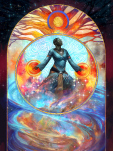








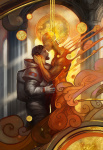
May 23, 2018
Writing Inspiration: 30 Random Settings
In addition to keeping a file of art and ideas for each of my fiction projects, I also keep two general files, Characters and Settings, which I dip into as needed for ideas and inspiration. Here are 30 recent additions to my Settings file.
Includes art and photography by Danlil Kozlovsky, Edward Delandre, Igor Kulkov, Nikita Pilyushkin, K. Kanehira, Dillon Marsh, Luca Locatelli, Evgeny Lushpin, Kyle Thompson, and others.




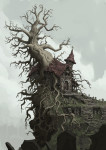





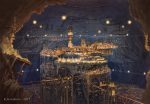
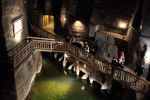
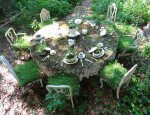
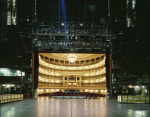


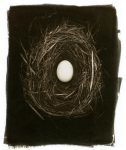
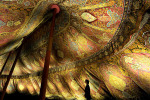





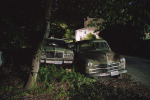


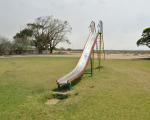
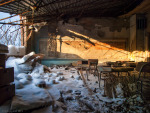
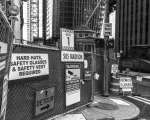
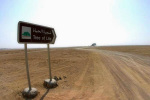
May 22, 2018
The Zombie Tarot
I can’t speak to how well this functions as a deck for divination, but the art is inspired commentary on contemporary culture through the skewering of our myths. The use of collage in particular is potent. (I’ve written before on collage, why has made a comeback recently, and why the medium is especially suited to statements about cultural excess.)
For example, casting television as The Hierophant plays on its role as primary disseminator of information, particularly in a crisis, a role that often morphs into arbiter of truth.
[image error]
The cultural phenomenon of the zombie apocalypse has always been a subconscious statement about our fears that we are consuming ourselves, that we will, through the detritus of consumer culture, be the authors of the end of our own vitality, that technology is turning us into zombies — not alive, but not dead.
The deck’s creators have magnified that artfully by choosing the midcentury period, when we were moth blithely unaware of the monsters stirring beneath us. Hence The Fool, a 1950s business man walking blissfully through an erupting graveyard, wreath in hand. Or cigarettes as The Devil.


And all of this in a tarot deck, which as a means of divination stands in direct contrast to the technological utopia falling apart around us.









[image error]



